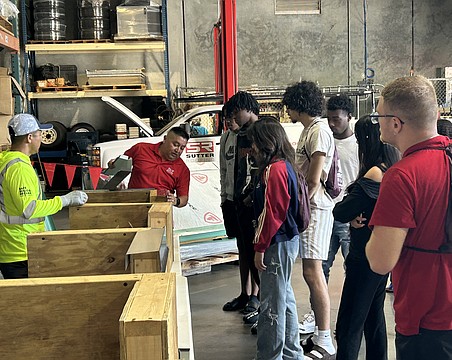The chief executive of a $2.1 billon company has some blunt words for Gulf Coast retailers navigating the recession: Despite the temptation, don't discount. 'That's where people ruin brands,' Rick Goings says.
In an era in which chief executives nationwide are under attack from several factions, Tupperware Brands head honcho Rick Goings is one of the last leftovers of a dying breed: The globetrotting, rock-star CEO.
His Rolodex includes actor Denzel Washington, former Secretary of State Condoleezza Rice — he calls her Condi — and Steve Case, co-founder and former CEO of America Online. His board appointments include being a governor of the World Economic Forum in Davos. And Goings lives in the same suburban Orlando gated community as Tiger Woods.
Despite his status, acquaintances and accomplishments, Goings still realizes his main job is to produce returns for shareholders of Orlando-based Tupperware Brands Corp., the publicly traded company behind the eponymous food storage containers.
And in another rarity for a CEO these days, Goings says the going for his company hasn't been too bad as of late, at least not as bad as it has been for some other retail companies.
“We're the beneficiaries right now of having half our business in emerging markets of the world,” says Goings, who spoke at a Boys & Girls Club of Manatee County corporate luncheon May 6. “Those markets are cooking and growing double-digit.”
Shares of the company, traded on the NYSE under the symbol TUP, have been up slightly since its April 22 earnings report, which, despite a sales dip, was perceived by many investors to be positive recession-era news.
The company reported earnings of $25.6 million, or 41 cents per share, for the first quarter of 2009, which ended March 28.
Although that was a 20% drop from the 2008 first quarter results of $32.1 million, or 51 cents per share, the 2009 results beat Wall Street estimates by 13 cents — cause for a rally these days.
Goings says the recession, while challenging, presents some opportunities for the company, founded in 1948 by Earl Tupper. A DuPont chemist, Tupper discovered a home-products use for Polyethylene, which was a new type of plastic.
For one, Goings predicts the slumping housing and stock markets will push more people into bringing lunch to work and saving more leftovers. That should boost Tupperware sales.
The recession also has led to a flashback moment for the company: The return of the Tupperware party. The company projects more than 100,000 people will hold Tupperware parties this year in the U.S., bringing back a
staple of the 1950s, when women made a social event out of gathering together to gab and buy and sell the latest Tupperware products.
Goings spoke to the Review about the company and its challenges before speaking at the luncheon. Here's an edited transcript of the conversation.
Q. How is Tupperware surviving the recession?
A. Just like many companies, we would prefer the global economy to be strong because we could do even better. But we're going to make it through this, and we're still going to have a good year. We're still talking about growing 2% to 5% top line.
If this were normal times, that number would be between 5% and 10%. So we're getting some of the impact of what we're seeing.
But we're going to do fine. The reason is we have a great business model. If there is a business model that navigates through these times better than others, it's our business model. There's an element that's countercyclical [and] our product line is particularly good for this time. With our Tupperware business, we've seen a dramatic increase in the number of people who bring lunch to work. More people are starting to batch cook and are not going out to dinner.
Q. How is the company leveraging the increase in more people bringing lunch to work and keeping their dinner leftovers?
A. We can take our product line and move it in that direction. We had a great month last month in Germany, where “Rumfort” is the word for leftovers. We launched “Rumfort” parties there, which basically work off the evidence that the average German family throws away 25% to 30% of the food they bring home. We show them how to do casseroles and breakfasts and how to pay for those products in 90 days.
Q. Tupperware's sales force comprises two million independent entrepreneurs. How has the job market impacted that segment of the company's business model?
A. In the past, when you didn't have such a big recruiting pool out there, you had to spend promotional dollars to recruit sales people. Now we don't have to do that. Now we can spend that recruiting money and redeploy it as incentives for a free gift for people to come to a Tupperware party.
Q. Tupperware doesn't cut prices on its products. Why?
A. We never discount. That's where people ruin brands. That's when you train customers to wait for a sale.
Q. Tupperware recently completed a major product line overhaul of its mainstay food storage containers, products that hadn't been tinkered with in more than 50 years. How much pressure was there to get that redesign right?
A. It was huge. I've been here 17 years, and it was hard to do initially, but it was the most important decision we ever made from a product standpoint. I knew we had to do it.
Rubbermaid had commoditized food storage. So we made a critical decision to say, “Wait a minute, Rubbermaid has come along and commoditized and knocked off our product line? We're not going to sit there and play their game. We're going to go where they can't go.”
We went upstream to higher tech products and more highly engineered resins. We brought out kitchen tools and gadgets. All the products had to be demonstrable where use shows results. Now we're getting $30 for ice cream scoops. They are getting $5 for ice cream scoops. And ours are guaranteed for life.
Q. You worked in executive roles at Avon for seven years before coming to Tupperware in 1992. How did Avon help you in your current position?
A. That experience was a terrific help. Anytime anyone was sent overseas at Avon, they were lost. They never came back more senior. I was sent to Europe and then Hong Kong, and when I came back to Avon headquarters, it was the first time in 102 years someone came back more senior.
I came back different. It made me an internationalist. Now my senior reporting team, of the 18 of them, only six are Americans.
just say yes
Rick Goings, chief executive of Orland-based Tupperware Brands, ended a 21-day trip to Europe with a lunch stop in Bradenton early last month.
Goings, who doubles as a board member and former chairman of the Boys & Girls Clubs of America, used the pit stop as a speech to raise money for the nonprofit organization, so it can build and run more clubs nationwide.
Speaking at a corporate luncheon attended by several Bradenton-area business leaders, Goings made a blunt plea for donations.
“It's easier to raise money for an art museum than a Boys & Girls Club,” says Goings. “I have nothing against an art museum, but we have got build more Boys & Girls Clubs.”
Speaking of giving out money, Goings had some choice words for the federal government's approach to the economy in his speech.
“We've been through six months of financial hell, and we could have a lot more out there,” Goings says. “This government can't keep saying 'yes' to all of the things it says yes to and still print money.”
AT A GLANCE
Tupperware Brands
Headquarters: Orlando
CEO: Rick Goings
FY 2008 Revenues: $2.16 billion
Stock symbol: TUP
Recent stock price: $24.32
52-week stock-price range: $10.91 to $41.33
Price-earnings ratio (trailing 12 months): 10.51
Dividend: .22
Market capitalization: $1.63 billion
Source: Google Finances






